3 categories (10 tests)
| Test Category | Best Performer | Worst Performer | Difference |
|---|---|---|---|
| Dry (2 tests) | |||
| Dry Braking | ▲ Continental Premium Contact 6: 34.2 M | ▼ Petlas Imperium PT515: 37.9 M | 3.7 M (9.8%) |
| Dry Handling | ▲ Continental Premium Contact 6: 107.1 s | ▼ Nokian Hakka Green 3: 109.4 s | 2.3 s (2.1%) |
| Wet (5 tests) | |||
| Wet Braking | ▲ Nokian Hakka Blue 3: 28.6 M | ▼ Petlas Imperium PT515: 38.2 M | 9.6 M (25.1%) |
| Wet Handling | ▲ Nokian Hakka Blue 3: 67.9 s | ▼ Petlas Imperium PT515: 72.6 s | 4.7 s (6.5%) |
| Wet Circle | ▲ Continental Premium Contact 6: 20.5 s | ▼ Petlas Imperium PT515: 22.1 s | 1.6 s (7.2%) |
| Straight Aqua | ▲ Michelin Primacy 4: 84.9 Km/H | ▼ Michelin e.Primacy: 75.2 Km/H | 9.7 Km/H (12.9%) |
| Curved Aquaplaning | ▲ Bridgestone Turanza T005: 69.8 m/sec2 | ▼ Michelin e.Primacy: 64 m/sec2 | 5.8 m/sec2 (9.1%) |
| Value (3 tests) | |||
| Price | ▲ Petlas Imperium PT515: 621 | ▼ Michelin e.Primacy: 1119 | 498.0 (44.5%) |
| Rolling Resistance | ▲ Michelin e.Primacy: 5.64 kg / t | ▼ Continental Premium Contact 6: 8.46 kg / t | 2.8 kg / t (33.3%) |
| Fuel Consumption | ▲ Continental EcoContact 6: 5.07 l/100km | ▼ Nokian Hakka Blue 3: 5.49 l/100km | 0.4 l/100km (7.7%) |
The wonderful people at the Swedish publication ViBilagare have tested ten sets of tyres in the popular 205/55 R16 size, and included "normal" AND "eco / EV" tyres from Continental, Michelin and Nokian. This means we have the Continental PremiumContact 6 vs EcoContact 6, Michelin Primacy 4 vs e.Primacy and Nokian Hakka Blue 3 vs Green 3 (these are the Nordic specific versions of the Nokian WetProof.)
Why no eco / low rolling resistance / EV tyres from Goodyear and Bridgestone? This test highlights the different approaches of certain tyre manufacturers, and while Tyre Reviews isn't sure on Bridgestones philosophy, Goodyear firmly believe that EV specific tyres aren't needed if you make all your tyres EV Ready, by focusing on low fuel consumption and excellent grip in all conditions for every tyre.
EV vs Normal Tyre Test Results
So how do the two types of tyre compare? Unfortunately, it doesn't look good for the ECO tyres. Low rolling resistance and grip, especially wet grip, are currently opposing qualities and this test highlights that. Ignoring the budget tyre, in nearly every grip tests the eco tyres were amongst the worst, with the Michelin e.Primacy stopping the VW Golf a full 5 meters behind the Primacy 4 in the wet, not too far off the budget tyre!
Aquaplaning wasn't any better for the ECO tyres as they start with reduced tread depth compared to regular tyres, which helps the rolling resistance.
How much this helps each tyres energy consumption is unknown, but the testers had Goodyear buff down their EfficientGrip Performance 2 from it's starting tread depth of 8.2mm down to the 6.1mm the Michelin e.Primacy starts with, and the rolling resistance dropped from 7.15 kg/ton to 6.62 kg/ton which put it right on the heels of the eco tyres.
Overall, ViBilagare considers the eco tyres to be too much of a compromise for the real world, the improvement the tyres bring in rolling resistance and noise levels aren't worth the considerable reduction in dry grip, wet grip, aquaplaning resistance and starting tread depth.
The Bridgestone Turanza T005 and Goodyear EfficientGrip Performance 2 might have finished third and sixth overall in this test, but they do seem to be a good halfway house between the "normal" tyres and the EV tyres.
This is of course something Tyre Reviews will be looking into in greater detail in the future.
Dry
The Continental PremiumContact 6 aced the dry braking test, stopping the car nearly a meter ahead of the second placed Toyo.
The PremiumContact 6 also led the way around dry handling, with Bridgestone and Toyo also performing well. The eco tyres were last in both dry tests, with the Nokian Hakka Green 3 really struggling.
Wet
Wet braking was led by the Nokian Hakka Blue 3 "normal" tyre, stopping the vehicle in 28.6 meters, where it's eco brother the Hakka Green 3 took a further 5.1 meters, which was the best of the eco tyres!
The Hakka Blue 3 led wet handling too, with the other regular tyres performing well. The Hakka Green 3 had an impressive result, matching the regular Primacy 4.
Regular tyres led the way in both straight and curved aquaplaning, likely due to their higher starting tread depths.
Environment
Unusually we have both rolling resistance data from machine testing, and a real world test where ViBilagare drove the Golf in a constant circle and measured the litres per 100km reading from the car.
The two sets of results mostly correlate, but there are some small differences. While there was a 40% difference between the tyres measured on the bench, this actually only made a 7.95% difference when testing on the road. This is because tyres makeup approximately 20% of a vehicles rolling resistance.
Even with the reduced tread depth, the low rolling resistance tyres were some of the most expensive on test.
Results
1st: Continental Premium Contact 6 | |||||||||||||||||||||||||||||||||||||||||||||||||||||||||||||||||||
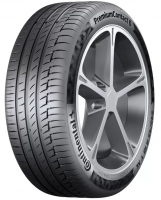
|
Short braking distances and high cornering grip. Safe driving characteristics. Slightly lower comfort level. Continental displays impressive braking performance on both wet and dry roads, with some of the shortest braking distances, especially in dry conditions. The lateral grip is also of the highest class on wet and dry. Steering input is quick with a good precision. When the cornering speeds eventually become too high, the "PC6" maintains a good manner that makes it easy to control in crisis situations. Read Reviews Buy from £79.99The sportier focus comes at the expense of comfort. It rolls a little harder over bumps and the noise level is higher than the quietest tyres on test. Short stopping distances and best handling performance with only minor weak sides give a clear test victory for Continental when everything is summed up. | ||||||||||||||||||||||||||||||||||||||||||||||||||||||||||||||||||
2nd: Nokian Hakka Blue 3 | |||||||||||||||||||||||||||||||||||||||||||||||||||||||||||||||||||

|
High wet grip, easy to control on the grip limit. Quiet on the rough road. Relatively high consumption. One of the big news of the test is the third generation Hakka Blue. Compared to its predecessor, there is a more well-balanced balance between wet/dry, where above all stability and grip level in the dry have lifted a notch. Read Reviews Wet roads are still the specialty of the tyre. The stopping distance is the shortest of the test. The driving characteristics are logical and easy to control with a steady rear end, even at high cornering speeds. However, Blue 3 misses the very highest points in the aquaplaning. The rolling resistance is also relatively high. While Blue 3 has some pattern noise on smooth asphalt, the noise level is very comfortable on a rough surface. High wet grip with improved sharpness on dry gives Nokian a second place overall. | ||||||||||||||||||||||||||||||||||||||||||||||||||||||||||||||||||
3rd: Bridgestone Turanza T005 | |||||||||||||||||||||||||||||||||||||||||||||||||||||||||||||||||||
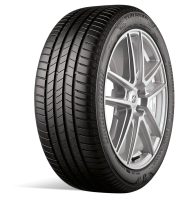
|
Rapid steering reactions, high driving pleasure. Rolls hard over bumps, road noise. Japanese Bridgestone offers an excellent mix between driving pleasure and relatively low consumption. Turanza T005 reacts quickly to steering input and can avoid sudden obstacles without significant understeer. The balance is neutral and despite quick reactions, the rear end remains steady under pressure. Read Reviews Buy from £67.94In the dry, the Bridgestone has short braking distances and provide excellent stability at higher speeds. Even in the wet parts, it performs among the best. Compared with previous years, T005 is more at easy on water and also manages aquaplaning well. The minus are comfort related. It is sensitive to the surface with a low-frequency sound on rough asphalt. Roll comfort is also a bit stiff over transverse road cracks. A very pleasant driving characteristics results a third place in total. | ||||||||||||||||||||||||||||||||||||||||||||||||||||||||||||||||||
4th: Toyo Proxes Comfort | |||||||||||||||||||||||||||||||||||||||||||||||||||||||||||||||||||
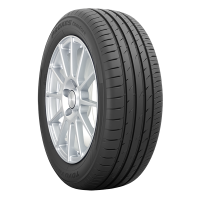
|
High grip level overall, good curved aquaplaning ability. Relatively high fuel consumption. The new Toyo Proxes Comfort replaces the predecessor Proxes CF2 and sits in a slightly lower price range, but this is not noticeable on the performance. The Proxes Comfort is frequently placed on the upper half of the test rounds with good braking performance and high cornering grip. The behavior is impeccable with a well-balanced behavior under pressure, both on wet and dry roads. However, it is somewhat more difficult to react on sudden direction changes at higher speeds. Read Reviews Buy from £70.85Resistance to aquaplaning is high, especially in curves. In terms of noise, it is really quiet on smooth roads, but has a tendency to submit low frequency sound on rougher asphalt. A high and even level without serious downsides impresses. This is an affordable tire we highly recommend. | ||||||||||||||||||||||||||||||||||||||||||||||||||||||||||||||||||
5th: Michelin Primacy 4 | |||||||||||||||||||||||||||||||||||||||||||||||||||||||||||||||||||
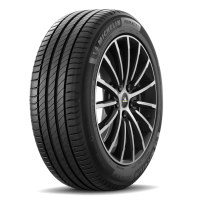
|
Logical and easy to drive. Good aquaplaning resistance. Side grip on wet road. Sound comfort. Primacy 4 has a natural and nice driving feel with a linear steering response combined with good stability, it remains logical and easy to drive when balancing on the grip limit. In the evasive maneuver tests, it handles the change of load effect without issue. Read Reviews Buy from £86.67Now when the environmentally optimized e.Primacy has been launched, we note that Primacy 4 has a deeper pattern depth than previous tests and "P4" has the highest resistance to aquaplaning in this group. However, the wet grip of the rubber compound itself is not top notch. Maybe this is the compromise that comes with Michelin's pronounced focus on durability? Furthermore, the road noise is sensitive to the surface with higher noise on rough asphalt. | ||||||||||||||||||||||||||||||||||||||||||||||||||||||||||||||||||
6th: Goodyear EfficientGrip Performance 2 | |||||||||||||||||||||||||||||||||||||||||||||||||||||||||||||||||||
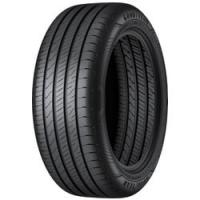
|
High comfort, low rolling resistance, price. Slightly diffuse driving characteristics. The wet grip is good but the driving precision leaves somewhat to be desired. It is difficult to place the car exactly where you want it under pressure. In the dry, it has a pronounced progressive steering reaction and does not handle evasive maneuvers with the same accuracy as the best. The braking distances are also average. Read Reviews Buy from £70.62On the other hand, the Goodyear EfficientGrip Performance 2 has other clear merits. Comfort is high with low road noise on rough roads. Consumption is on par with eco-tires and compared to these, Goodyear has significantly better safety margins! This is a good compromise between rolling resistance and road safety. | ||||||||||||||||||||||||||||||||||||||||||||||||||||||||||||||||||
7th: Nokian Hakka Green 3 | |||||||||||||||||||||||||||||||||||||||||||||||||||||||||||||||||||

|
Silent. Decent wet grip for an eco-tire. Long braking distances. Not efficient enough. Nokian's new environmental tires do not have as shallow tread depth as some other eco-tires. The Finnish green tire also performs better on wet roads compared to the other two environmental options. The braking distance in the wet is not impressive, but the drivability and cornering grip are approved. The behavior is well balanced with light understeer and the driver gets good feedback when the grip limit approaches. Read Reviews On the other hand, Hakka Green is all the worse on dry roads with mediocre curve speeds and long stopping distances. However, it is the quietest of all on the rough road. For an eco-tire with safety compromises, the consumption is too high. There are “normal” tires that are just as economical. Choose them instead. | ||||||||||||||||||||||||||||||||||||||||||||||||||||||||||||||||||
8th: Continental EcoContact 6 | |||||||||||||||||||||||||||||||||||||||||||||||||||||||||||||||||||
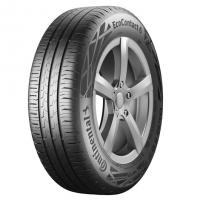
|
Low consumption. Good comfort. Poor wet grip. Extended braking distances. Slow steering reaction. While the sibling PremiumContact 6 becomes test winner, the EcoContact 6 finishes further down the field. The wet grip leaves a lot to be desired and often it is the rear that releases the grip first with an unwelcome slide. The stopping distance on wet roads is well over four meters longer than PremiumContact 6 at 80 km/h – a difference that grows significantly at higher speeds. With relatively low tread depth – 6.7 mm new – it aquaplanes early. Read Reviews Buy from £95.63In the dry the EcoContact 6 does not perform particularly well, it is a bit slow to react to steering input and change course. However, the high-speed stability is good. The Continental EcoContact 6 has the lowest consumption in the test and comfort s very high. But that cannot justify a buy. | ||||||||||||||||||||||||||||||||||||||||||||||||||||||||||||||||||
9th: Michelin e.Primacy | |||||||||||||||||||||||||||||||||||||||||||||||||||||||||||||||||||
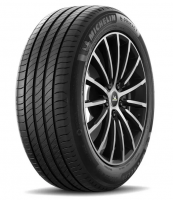
|
Low rolling resistance, good stability, crisp steering feel. Very poor wet grip! Long stopping distances in wet. The Michelin ePrimacy eco-tyre is said to have a CO2-neutral manufacturing process. Although the rolling resistance was the lowest in the laboratory, it was not the most frugal when we measured actual fuel consumption. Compared to Primacy 4, e.Primacy has a slightly better steering response and sharper high-speed stability. It is noticeable that it is designed to handle heavier EV-cars, partly helped by the unusually low tread depth – only 6.1 mm. Read Reviews Buy from £88.87On dry roads, the grip level is slightly less than the Michelin Primacy 4. On wet roads however, the differences are enormous with poor cornering grip, early aquaplaning and worryingly long braking distances. It is really difficult to drive on wet asphalt. The environmental thinking went too far. In terms of points, it falls far behind. | ||||||||||||||||||||||||||||||||||||||||||||||||||||||||||||||||||
10th: Petlas Imperium PT515 | |||||||||||||||||||||||||||||||||||||||||||||||||||||||||||||||||||
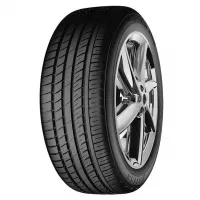
|
Good shock absorption and low noise on rough asphalt. Difficult to control in a crisis situations. Poor braking performance. Turkish Petlas offers one of the cheapest products you can find online. But Imperium PT515 is NOT an affordable solution. This is like throwing money in the lake. The stopping distance on wet asphalt is a full 10 meters longer than the best tires from 80 km / h. Read Reviews In the evasive maneuver tests on dry roads, the Petlas tires can’t neutralize the lateral forces but have major problems with the load shift effect, which means that the tire skids wide and becomes difficult to control. On wet roads, it moods alternately between understeer into the curve followed by an oversteer in the middle of the turn. Budget tires often fitted on older, cheaper cars with poorer crash safety. It is a life-threatening combination. Save money on something other than the tires. | ||||||||||||||||||||||||||||||||||||||||||||||||||||||||||||||||||








